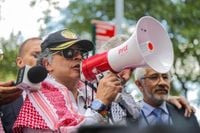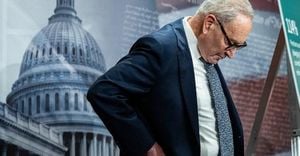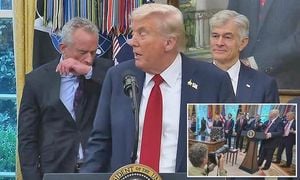Diplomatic relations between the United States and Colombia have taken a dramatic turn following the U.S. State Department’s decision to revoke Colombian President Gustavo Petro’s visa. The move, announced late Friday, September 26, 2025, via a post on X (formerly Twitter), has ignited a fierce exchange of words, public gestures of solidarity, and warnings from analysts about the future of bilateral ties.
According to the State Department’s statement, the visa was revoked due to Petro’s "reckless and incendiary actions" in New York City, where he addressed a pro-Palestine protest and called on U.S. soldiers to "disobey Trump’s orders." The department accused Petro of urging U.S. troops to incite violence, a claim that President Petro and his allies have forcefully denied.
The controversy erupted in the wake of Petro’s speech to the United Nations General Assembly. There, he fiercely condemned the Trump administration’s support for Israel’s military actions in Gaza and criticized U.S. anti-drug policies, arguing that Washington uses the fight against drug trafficking as a pretext to control Latin American resources. As reported by multiple outlets, Petro’s speech was followed by his participation in a massive pro-Palestine rally in New York, where he called for the creation of a "Salvation Army of the World" to "liberate Palestine." Petro argued that this international force should be larger than the U.S. military and urged, "That’s why from here, from New York I ask all U.S. Army soldiers to disobey the order of Trump. I ask you not to point your guns at humanity."
The U.S. response was swift and severe. Alongside revoking Petro’s visa, the State Department canceled visas for several Colombian government officials, including the Ministers for Equality and for Mines and Energy. The action was widely interpreted as punishment for Petro’s sharp criticism of both the U.S. and Israeli governments during high-profile events in New York.
Petro, however, was quick to downplay the practical impact of the revocation, pointing out that he holds Italian dual nationality and could therefore travel to the U.S. using the Electronic System for Travel Authorization (ESTA). On his X account, he wrote, "Revoking the visa is not an act against Petro, but against the United Nations and against the fight for the survival of humanity." He further argued, "What the U.S. government is doing to me breaks all the rules of immunity on which the functioning of the United Nations and its General Assembly is based. There is total immunity for presidents attending the Assembly."
Petro’s assertion drew on the fact that the U.S. had also denied a visa to Palestinian Authority President Mahmoud Abbas, preventing him from addressing the same UN General Assembly session. "The prohibition of entry into the U.S. for the president of the Palestinian Authority, Mahmoud Abbas, to speak before the eightieth session of the UN General Assembly, as well as this revocation of his visa, demonstrate that the U.S. government no longer complies with international law," Petro stated. He maintained that Washington’s actions were a direct response to his demands that the U.S. and Israeli militaries halt their support for what he termed "the genocide in the Gaza Strip."
The diplomatic standoff quickly escalated as several senior Colombian officials announced they would renounce their own U.S. visas in solidarity with Petro. Foreign Minister Yolanda Villavicencio was among the first, followed by Daniel Quintero, a progressive presidential hopeful and former Mayor of Medellín. Quintero declared, "Today more than ever I am proud of our president," and volunteered to forfeit his visa. The legal secretary of the Colombian presidency also gave up his U.S. travel authorization, echoing the wave of support among Petro’s inner circle.
Yet, these gestures were met with open mockery from Washington. U.S. Deputy Secretary of State Christopher Landau responded to Quintero’s announcement with a wry "¡A la Orden!"—Spanish for "at your service." When Colombian Interior Minister Armando Benedetti announced his intention to renounce his visa and called on others to do the same, Landau retorted on X, "How can you ‘give up’ something you don’t have?" The public sparring underscored the deepening rift between the two governments.
Despite the heated rhetoric, Petro insisted that the U.S. would not face reciprocal restrictions on its citizens entering Colombia. He stated that former President Trump would be welcome in Colombia, though he advised Trump not to be "surrounded by genocides." Petro clarified, "U.S. citizens will not be banned from entering, but war criminals or those against humanity will not be allowed into the country."
The fallout from these events has alarmed analysts who see the diplomatic row as symptomatic of broader tensions between the Petro and Trump administrations. Throughout 2025, the two governments have clashed repeatedly—not just over Gaza, but also over U.S. deportation flights, drug control strategies, and the future of multilateral cooperation in Latin America. Sergio Guzmán, Director at Colombia Risk Analysis, warned that the latest confrontation is inflicting "unnecessary damage to diplomatic ties at an already fractious time for bilateral relations." He added, "[This] puts Colombia on a poor footing for its very ambitious multilateral agenda, all to serve the capricious desire of President Petro." Guzmán suggested that the acts of solidarity among Petro’s cabinet signal an even more confrontational and personalist foreign policy ahead: "We can expect… a much more capricious foreign policy from now on because it seems that Petro has eliminated any speck of dissent from any cabinet official."
The episode has also raised significant questions about the future of international norms. Petro’s claim that the U.S. violated diplomatic immunity by revoking his visa while he was attending the UN General Assembly has been echoed by some legal scholars, who point out that such immunity is a cornerstone of the UN’s functioning. Whether the U.S. action sets a new precedent or remains an isolated incident is a question that diplomats and international lawyers will likely debate for months to come.
For now, the diplomatic standoff between Washington and Bogotá shows no sign of abating. With both sides trading barbs on social media and in official statements, and with broader issues like drug policy and Middle East conflict at stake, the relationship between the U.S. and Colombia faces one of its most turbulent periods in recent memory.
As the dust settles, one thing is clear: the reverberations from this episode will be felt not just in Bogotá and Washington, but in diplomatic circles around the world.




